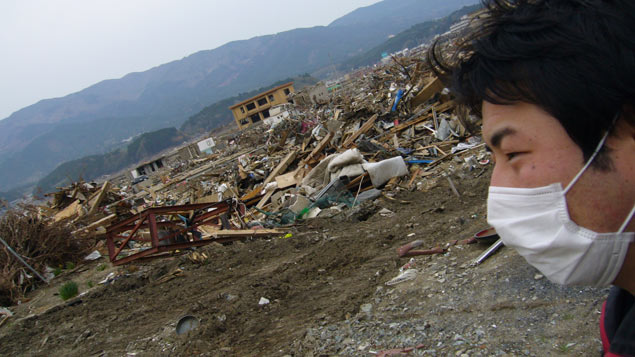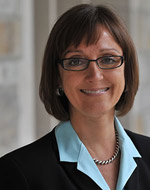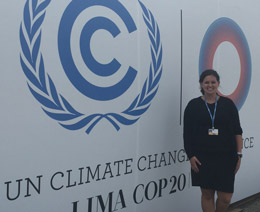 |
Nate Engle (MPP/SNRE ’07), Climate Change Specialist, The World Bank
Helped to create a risk-assessment tool for World Bank staff and other development practitioners to screen proposed projects—including roads, bridges, and schools—for climate change and disaster threats. When risks are identified, Nate Engle helps staff think through strategies to adapt projects accordingly.
 |
Elisabeth Gerber, the Jack L. Walker, Jr., Professor of Public Policy, Gerald R. Ford School of Public Policy
Collecting and analyzing surveys of local government officials on climate adaptation in the Great Lakes region. “Cities are on the front lines in dealing with the effects of climate change, which might mean more storms and floods, or it might mean drought,” says Professor Elisabeth Gerber. They do this in a number of ways: they change their building codes and zoning ordinances; they change their landscaping practices; they put in place emergency management plans. But they also need to upgrade their infrastructure—including roads, water treatment centers, stormwater drainage systems, and more—all of which can be very expensive and a huge challenge for elected officials. “One of the key things we do in the study is ask, ‘Which of the following actions are you taking?’ and ‘Is climate change a specific motivation for doing it?’” says Gerber. “In many places around the Great Lakes, local governments are making important adaptations. They might not be calling it climate adaptation, but it still counts.”
Caitlin Jacob (MPP/MUP ’15), 2014 Dow Sustainability Fellow
Drafting a new floodplain ordinance for the City of Ann Arbor. The goal: to manage risk and regulate development in flood-prone areas—those known to be at risk now, and those expected to be at risk in the distant future.
Charlotte Mack (MPP/SNRE '10), Consultant, Abt Associates
The United Nations international climate change treaty asks least-developed countries to prepare national adaptation plans for climate change. Charlotte Mack has helped to kickstart the national adaptation planning process in 13 countries, including Cape Verde, Ghana, Jamaica, Nigeria, Tanzania, and others. Mack conducts kickoff workshops with relevant policymakers and practitioners from every sector, taking participants through a series of exercises to illuminate how climate change will impact their development goals and to identify measures to reduce climate risk.
 |
Annie Maxwell (AB ’00, MPP ’02), President, Skoll Global Threats Fund
Using advances in remote sensing, satellite imagery, and crowdsourcing to get a more accurate picture of the droughts, floods, and heat waves that disrupt food systems and lead to global unrest. “Climate-related water shocks are increasing in frequency and severity,” says Annie Maxwell. “This can spark cascading crises that ripple across borders, regions, and the world.” By convening new partnerships, the Skoll Global Threats Fund is looking for ways to ensure that governments, NGOs, and UN agencies have access to the information they need to monitor, assess, and quickly respond—not just to droughts and floods, but also to the social, environmental, and geopolitical crises they trigger.
Alan Miller (MPP/JD ’74), Independent Consultant, United Nations Development Programme
Helping 11 African “least developed” countries modernize weather and emergency warning systems. “Until very recently, the primary technology fundamental to modern weather systems has been sophisticated, capital intensive, difficult-to-maintain radars and dopplers—not a great fit for cash-strapped countries,” says Alan Miller. “Now, for tens of thousands of dollars rather than hundreds of thousands, we can create automated weather stations on cell phone towers—which are all across Africa—with no moving parts, a little solar panel, a battery pack, and a sensor that picks up lightning in the clouds. That will save lives, and produce enormous short- and long-term economic and social benefits.”
Hiromi Nishizawa (MPP ’95), Program Coordinator, Kyoto Center for Climate Action
Supports Kyoto’s local governments as they draft and implement green agendas and trains local educators about climate change and global warming.
Michelle Sargent Novotny (MPP ’07), Senior Water Analyst, San Francisco Public Utilities Commission
Helps 2.4 million San Francisco Bay area residents prepare for drought. “Every drought year makes the situation more severe, so we try to communicate needs to customers early and often so they have certainty about how much water they can purchase and what our supplies are looking like based on precipitation and snow pack.”
 |
Sarah Pendergast (BA ’10), Legislative Assistant, Climate and Energy Project, Union of Concerned Scientists
Writes briefs on Congressional hearings about climate change and adaptation and consults with policymakers in coastal areas to push for flood preparedness and share best practices.
Kaitlin Raimi, Assistant Professor of Public Policy (begins fall 2015), Gerald R. Ford School of Public Policy
Explores how to leverage legacy concerns in a soon-to-be-released paper for Ecology Law Quarterly. “People do care about how they’re remembered,” says Kaitlin Raimi. “Politicians and presidents presumably care even more than the rest of us because their actions are more public.” Kaitlin Raimi believes people can be motivated to behave more sustainably by recording individual responses to climate change “in ways that will not only be disclosed today, but will also be easily accessible for many generations.”
Joel Smith (MPP ’82), Principal, Abt Associates
Edited the first comprehensive study of potential climate change impacts in the United States for the U.S. Environmental Protection Agency in 1989. Now consults with the EPA, Kresge Foundation, United Nations, USAID, World Bank, and other agencies on climate change impacts and adaptation.
Email [email protected] to share energy and environmental policy stories for our expanded online roundup.
Below is a formatted version of this article from State & Hill, the magazine of the Ford School. View the entire Spring 2015 State & Hill here.